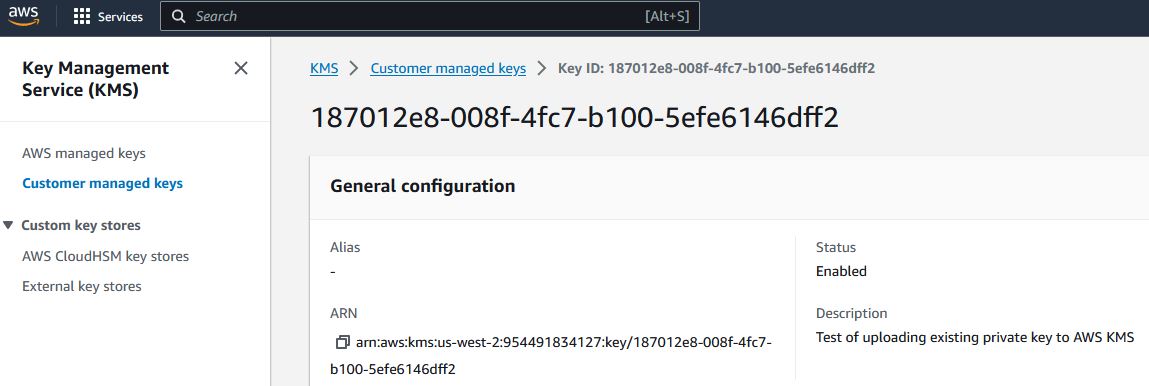|
|
(Perl) Create CAdES p7m using AWS KMS to Sign in the Cloud
Demonstrates how to create a CAdES p7m, using AWS KMS. The signing of the hash happens in the Cloud on AWS KMS. Everything else regarding the creation of CAdES happens locally within Chilkat.
Note: This example requires Chilkat v9.5.0.96 or greater.
use chilkat();
# This example assumes the Chilkat API to have been previously unlocked.
# See Global Unlock Sample for sample code.
# Load the certificate used for signing. The certificate's private key is stored in AWS KMS
# However, we still need the certificate locally (without private key).
$cert = chilkat::CkCert->new();
$success = $cert->LoadFromFile("qa_data/certs/myCert.cer");
if ($success == 0) {
print $cert->lastErrorText() . "\r\n";
exit;
}
# Here's a screenshot showing the key ID of a private key in AWS KMS:
 # To sign using AWS KMS,
# add the following lines of code to specify your AWS authentication credentials,
# and the ID of the KMS private key.
$jsonAwsKms = chilkat::CkJsonObject->new();
# Set the "service" equal to "aws_kms" to tell Chilkat to use AWS KMS for signing.
$jsonAwsKms->UpdateString("service","aws_kms");
$jsonAwsKms->UpdateString("access_key","ACCESS_KEY");
$jsonAwsKms->UpdateString("secret_key","SECRET_KEY");
# Make sure to specify the correct region for your case.
$jsonAwsKms->UpdateString("region","us-west-2");
# In the above screenshot, our key ID is "187012e8-008f-4fc7-b100-5efe6146dff2". You will use your key ID.
$jsonAwsKms->UpdateString("key_id","187012e8-008f-4fc7-b100-5efe6146dff2");
$success = $cert->SetCloudSigner($jsonAwsKms);
$crypt = chilkat::CkCrypt2->new();
$success = $crypt->SetSigningCert($cert);
if ($success == 0) {
print $crypt->lastErrorText() . "\r\n";
exit;
}
# The CadesEnabled property applies to all methods that create PKCS7 signatures.
# To create a CAdES-BES signature, set this property equal to true.
$crypt->put_CadesEnabled(1);
$crypt->put_HashAlgorithm("sha256");
$signedAttrs = chilkat::CkJsonObject->new();
$signedAttrs->UpdateInt("contentType",1);
$signedAttrs->UpdateInt("signingTime",1);
$signedAttrs->UpdateInt("messageDigest",1);
$signedAttrs->UpdateInt("signingCertificateV2",1);
$crypt->put_SigningAttributes($signedAttrs->emit());
# You can sign any type of file..
$inputXmlPath = "qa_data/e-Invoice.xml";
$outputP7mPath = "qa_output/signed.p7m";
# Create the CAdES-BES attached signature, which contains the original data.
# Chilkat will build the .p7m locally, but will (internally) use ARSS
# to do the RSA signing remotely.
$success = $crypt->CreateP7M($inputXmlPath,$outputP7mPath);
if ($success == 0) {
print $crypt->lastErrorText() . "\r\n";
exit;
}
print "Success." . "\r\n";
# To sign using AWS KMS,
# add the following lines of code to specify your AWS authentication credentials,
# and the ID of the KMS private key.
$jsonAwsKms = chilkat::CkJsonObject->new();
# Set the "service" equal to "aws_kms" to tell Chilkat to use AWS KMS for signing.
$jsonAwsKms->UpdateString("service","aws_kms");
$jsonAwsKms->UpdateString("access_key","ACCESS_KEY");
$jsonAwsKms->UpdateString("secret_key","SECRET_KEY");
# Make sure to specify the correct region for your case.
$jsonAwsKms->UpdateString("region","us-west-2");
# In the above screenshot, our key ID is "187012e8-008f-4fc7-b100-5efe6146dff2". You will use your key ID.
$jsonAwsKms->UpdateString("key_id","187012e8-008f-4fc7-b100-5efe6146dff2");
$success = $cert->SetCloudSigner($jsonAwsKms);
$crypt = chilkat::CkCrypt2->new();
$success = $crypt->SetSigningCert($cert);
if ($success == 0) {
print $crypt->lastErrorText() . "\r\n";
exit;
}
# The CadesEnabled property applies to all methods that create PKCS7 signatures.
# To create a CAdES-BES signature, set this property equal to true.
$crypt->put_CadesEnabled(1);
$crypt->put_HashAlgorithm("sha256");
$signedAttrs = chilkat::CkJsonObject->new();
$signedAttrs->UpdateInt("contentType",1);
$signedAttrs->UpdateInt("signingTime",1);
$signedAttrs->UpdateInt("messageDigest",1);
$signedAttrs->UpdateInt("signingCertificateV2",1);
$crypt->put_SigningAttributes($signedAttrs->emit());
# You can sign any type of file..
$inputXmlPath = "qa_data/e-Invoice.xml";
$outputP7mPath = "qa_output/signed.p7m";
# Create the CAdES-BES attached signature, which contains the original data.
# Chilkat will build the .p7m locally, but will (internally) use ARSS
# to do the RSA signing remotely.
$success = $crypt->CreateP7M($inputXmlPath,$outputP7mPath);
if ($success == 0) {
print $crypt->lastErrorText() . "\r\n";
exit;
}
print "Success." . "\r\n";
|

